Please use this identifier to cite or link to this item:
https://hdl.handle.net/20.500.12202/9237| Title: | Dabru emet: Some reservations about a Jewish statement on Christians and Christianity |
| Authors: | Berger, David |
| Keywords: | Judaism --Relations --Christianity. Christianity and other religions --Judaism. |
| Issue Date: | 2010 |
| Publisher: | Academic Studies Press |
| Citation: | Berger, D. (2010). Dab. In rubmet: Some reservations about a Jewish statement on Christians and Christianity. In Persecution, polemic, and dialogue : essays in Jewish-Christian relations (pp. 392-398). Academic Studies Press. |
| Series/Report no.: | Bernard Revel Faculty Publications;2010 |
| Abstract: | Shortly after the publication of Dabru Emet: A Jewish Statement on Christians and Christianity in The New York Times of September 10, 2000, I was contacted by the Union of Orthodox Jewish Congregations of America to formulate a brief reaction. What emerged was the following paragraph, which was posted on the Union's website and later adopted by the Rabbinical Council of America as its official position on the document ¶ . This is in many ways an admirable statement composed by people for whom I have high regard. I agree with much of it, including the controversial but carefully balanced passage denying that Nazism was a Christian phenomenon. However, I did not agree to sign it for several reasons. First, for all its exquisitely skillful formulation, it implies that Jews should reassess their view of Christianity in light of Christian reassessments of Judaism. This inclination toward theological reciprocity is fraught with danger. Second, although it is proper to emphasize that Christians "worship the God of Abraham, Isaac, and Jacob, creator of heaven and earth," it is essential to add that worship of Jesus of Nazareth as a manifestation or component of that God constitutes what Jewish law and theology call avodah zarah, or foreign worship-at least if done by a Jew. Many Jews died to underscore this point, and the bland assertion that "Christian worship is not a viable religious choice for Jews" thoroughly inadequate. Finally, the statement discourages either community from "insisting that it has interpreted Scripture more accurately than the other." While intended for the laudable purpose of discouraging missionizing, this assertion conveys an uncomfortably relativistic message. (from Introduction). |
| Description: | Book chapter |
| URI: | https://ezproxy.yu.edu/login?url=https://search.ebscohost.com/login.aspx?direct=true&AuthType=ip,sso&db=nlebk&AN=500811&site=eds-live&scope=site&ebv=EB&ppid=pp_392 https://hdl.handle.net/20.500.12202/9237 |
| ISBN: | 9781618110619 |
| Appears in Collections: | Bernard Revel Graduate School of Jewish Studies (BRGS): Faculty Publications |
Files in This Item:
| File | Description | Size | Format | |
|---|---|---|---|---|
| David Berger Dabru Emet (2010) In Persecution, Polemic, and Dialogue _ English 392-398.pdf | 1.7 MB | Adobe PDF |  View/Open |
This item is licensed under a Creative Commons License

